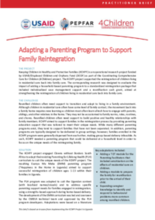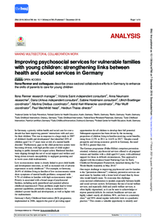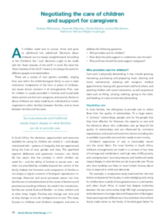Displaying 321 - 330 of 947
This Practitioner Brief presents key learning and recommendations from the Keeping Children in Healthy and Protective Families (KCHPF) project, an operational research project which supported the reintegration of children living in residential care back into family care in Uganda.
The aim of this meta-analysis is to identify the most effective interventions to promote parental engagement and family reunification in high-income countries.
This chapter from the Handbook of Parenting and Child Development Across the Lifespan explores five domains of research connecting social support and parenting: (1) intergenerational transmission of parenting; (2) community and neighborhood; (3) marriage quality; (4) grandmothers; and (5) offline and online friends.
This article from BMJ describes cross-sectoral collaborative efforts in Germany to enhance the skills of parents to care for young children.
The aim of this study was to examine changes in parental empowerment and child behavioural problems during a period of youth care and how changes are related to the kind of services provided.
This randomized controlled trial (RCT) evaluated the effectiveness of the Incredible Years® (IY) Parenting Program in modifying children's behavioral problems, parenting practices and parents' psychological well-being among families under child protection and using other special support services.
Nurturing Strangers focuses on loving nonviolent re-parenting of children in foster care. This book is a jargon-free mix of narrative and real-life case studies, together with the theory and practice of nonviolence.
This study examines child protection risks faced by preschool age children (3-5 years old) and adolescents (10-14 years old) in Phnom Penh, Cambodia and determines the interconnectivity between such risks and education.
Using data from age 3 of the Fragile Families and Child Wellbeing Study, the current study explores the complex relationships between U.S. childcare subsidies and neglect.
This chapter from the South African Child Gauge 2018 focuses on childcare and children’s caregivers in South Africa and aims to address the following questions: Who provides care for children? How does the state support or undermine care choices? Why and how should the state support caregivers?




